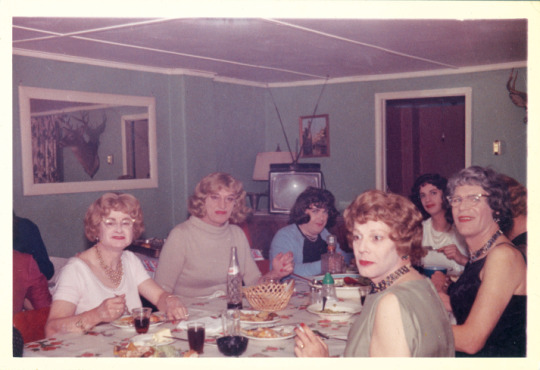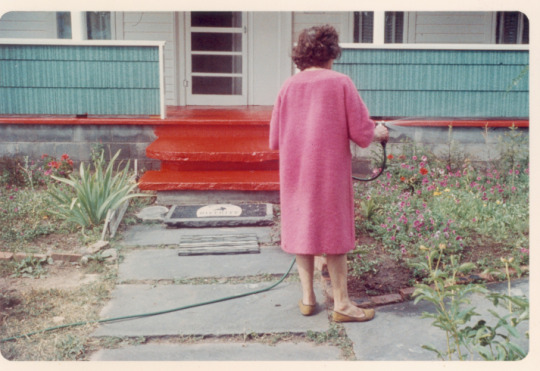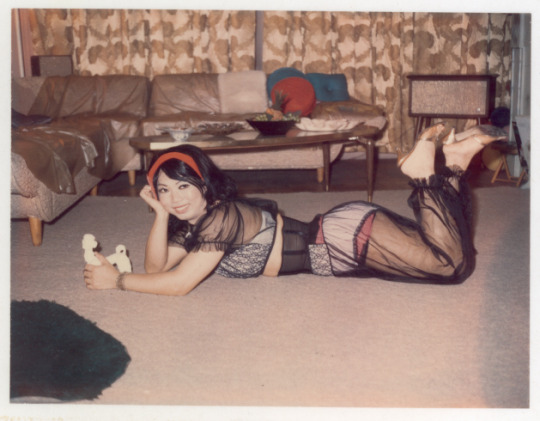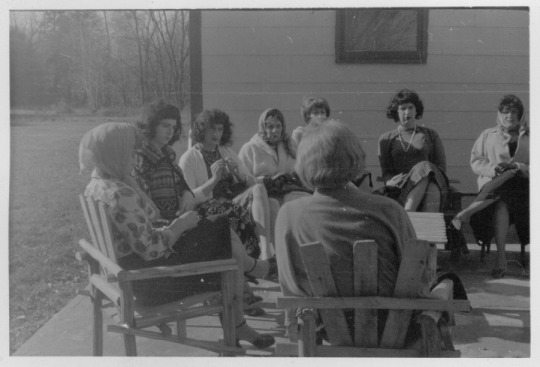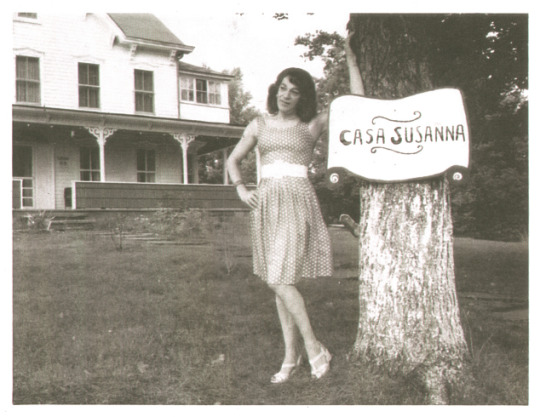Photo



📣 Bi people make up the largest portion of the LGBTQ community, but are often erased and face higher risk than their peers for sexual assault and suicide 📣
Our new guide discusses #bi, #pan, and many other multisexual identities; romantic orientations; preventing bi-erasure and biphobia; navigating gender and bisexuality; exploring different relationship types; and self-care tips 💜
During Bi Awareness Week, help us create a safer world for bi youth by reading and sharing our new guide: TRVR.org/BiGuide 💗💜💙
🎨 art by Ashley Lukashevsky 🎨
564 notes
·
View notes
Photo

As we make our way through #DVAM2020, we remember that our work does not end until we dismantle white supremacy, until we meet the needs of Black and non-Black survivors of color, until we eradicate domestic violence and violence in all forms… If we all do just #1thing / #UnaCosa every day, we know that we can accomplish this goal. Together, we can end violence and support safe and healthy communities. 💜
15 notes
·
View notes
Link
We Keep Each Other Safe: A Guide By and For Black, Indigenous, Latinx, POC and LGBTQ Communities Navigating the COVID-19 Pandemic
There is a lot that we don’t yet know about the new virus that causes COVID-19. We do know that systemic injustices continue, now in combination with COVID-19, to harm and kill communities of color, poor people, communities doing particular work and living in particular environments, immigrants, and queer and trans people.
We put this guide together to acknowledge the uneven and unsafe structures and institutions that people of color, immigrants, Indigenous people and queer and trans people engage with every day and to provide necessary support in that context. As the country reopens and throughout the pandemic, this information is critical for our communities.
This guide is designed by and for our communities to help us keep each other safe during the pandemic, to make sense of and spread important information coming out about COVID-19, and to support all of us in getting the best care possible if any of us or any of our loved ones become sick with COVID-19. By keeping this information on hand and by giving us your feedback on the guide, you are making a safer world for all of us.
25 notes
·
View notes
Link
For far too long, the histories, experiences, and identities of LGBTQ people of color have not been centered in our schools, in our communities, or in our history books. Brick by Brick is changing that by creating a curriculum that’s adaptable to any virtual or in-person environment (classroom, GSA club, or anything else!). During this Pride Month, we released Brick by Brick: Building LGBTQ Advocacy that speaks to the experiences and identities for students of color. This advocacy curriculum is the first-of-its-kind project designed to build and inspire current and future advocates and activists.
35 notes
·
View notes
Link
Because queer and trans people experience violence at similar, and in some instances higher, rates as heterosexual people, it is critical that health care and other providers ensure that their practice is culturally inclusive for queer and trans people and that they are talking to all of their patients about the effects that intimate partner violence can have on health.
Want more information about the serious long term health impacts of violence? Get the facts.
Resources
Download and order the materials on our online store. The following resources are available in both English and Spanish:
LGBTQ Poster
LGBTQ Safety Card
Trans/GNC Safety Card
44 notes
·
View notes
Link
Abusive partners in LGBTQ relationships use all the same tactics to gain power and control as abusive partners in heterosexual relationships — physical, sexual or emotional abuse, financial control, isolation and more.
But abusive partners in LGBTQ relationships also reinforce their tactics that maintain power and control with societal factors that compound the complexity a survivor faces in leaving or getting safe in an LGBTQ relationship.
15 notes
·
View notes
Link
Do you know about FORGE?
FORGE is a national transgender anti-violence organization, founded in 1994. Since 2009, we have been federally funded to provide direct services to transgender, gender non-conforming and gender non-binary survivors of sexual assault. Since 2011, FORGE has served as the only transgender-focused organization federally funded to provide training and technical assistance to providers around the country who work with transgender survivors of sexual assault, domestic and dating violence, and stalking. Our role as a technical assistance provider has allowed us to directly see key continued and emerging challenges many agencies are experiencing in serving sexual assault survivors of all genders. Some specific info they have for trans and significant others friends and family related to domestic violence and support.
Trans/SOFFA Survivors
Providers of trans+ survivors
Peer support listserv (available now)
Resource lists (available now)
Writing to Heal online (courses offered throughout the year)
Publications (coming soon)
Provider/consumer demonstration projects(Completed project learn more)
Community Cares
Helpline (available now: 414.559.2123 AskForge [at] forge-forward [dot] org) – including referrals to providers in your area
Conference workshops
Support for your own provider(available now: 414.559.2123 AskForge [at] forge-forward [dot] org)
10 notes
·
View notes
Photo

Giving consent for one activity, one time, does not mean giving consent for more or future sexual contact.
70 notes
·
View notes
Link
DIY Halloween, just in case you needed an idea
1 note
·
View note
Link
“Reproductive coercion is an umbrella term that encompasses a wide range of abuses, all meant to “maintain power and control in a relationship,” according to the ACOG. It commonly takes the form of active birth control sabotage — like hiding, destroying, or withholding contraception (or, according to The National Domestic Violence Hotline (The Hotline), withholding finances for purchasing birth control); poking holes in a condom or removing a condom during sex without consent (an act known as “stealthing”); failing to carry out the agreed-upon pull out method; and even physically removing contraception like IUDs, vaginal rings, and patches.”
105 notes
·
View notes
Link

International Pronouns Day seeks to make respecting, sharing, and educating about personal pronouns commonplace.
Referring to people by the pronouns they determine for themselves is basic to human dignity. Being referred to by the wrong pronouns particularly affects transgender and gender nonconforming people. Together, we can transform society to celebrate people’s multiple, intersecting identities.
35 notes
·
View notes
Photo
Happy International Pronouns Day!!!
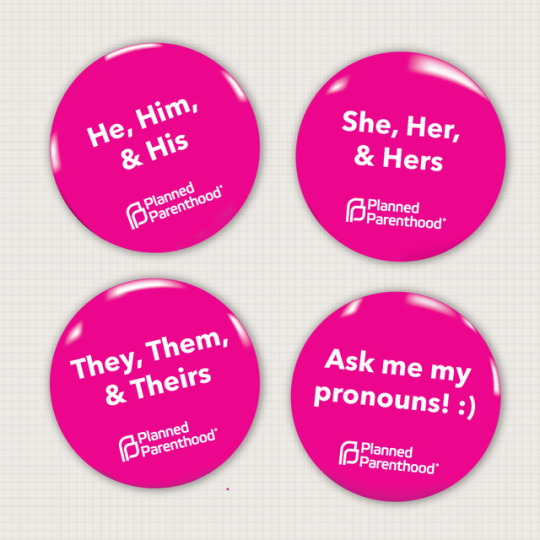
Ask for and respect people’s pronouns.
2K notes
·
View notes
Photo

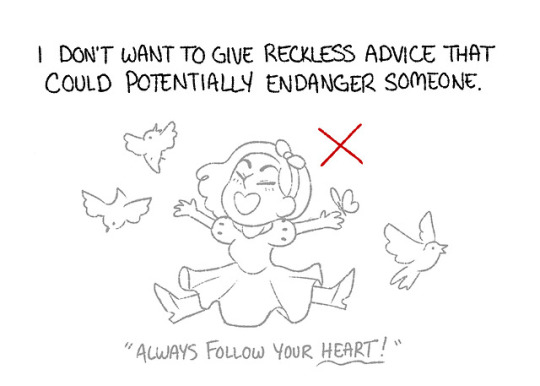
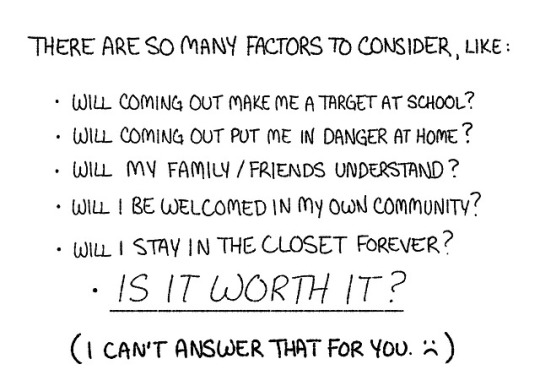



CAPTION: I get lots of messages asking for advice on * COMING OUT * But honestly… I don’t know what to say. I don’t want to give reckless advice that could possibly endanger someone, like (”Always follow your heart!”). There are so many factors to consider, like: Will coming out make me a target at school? Will coming out put me in danger at home? Will my family/friends understand? Will I be welcomed in my own community? Will I stay in the closet forever? Is it worth it? I can’t answer that for you.
It’s also important to know that coming out is an unending process. Strangers, distant family, new friends, coworkers, crushes… every decision to share or not to share becomes a calculated gamble. Please know there is no shame in choosing not to come out. Your safety and well-being comes first. Your identity is still true whether anybody knows about it or not. I wish I could keep you all safe.
20K notes
·
View notes
Text
Yup. we come out a lot, and sometimes it harder than others.
QueerTips Says: Self-advocacy and coming out to your healthcare provider

Needing medical care while being queer can be really hard for some of us. Why? Some of us lack access to trained providers that know how to talk to us and care for us, some of us have had way too many awful experiences and even thinking about making an appointment can bring up a mild sense of panic. On top of those kinds of worries and fears, some of us don’t have health insurance or money to pay for care so our options are even more limited. There are often a lot of barriers to care to contend with for queer folks. If we get to the place where we’ve actually gotten ourselves to an appointment and we’re walking in the door and checking-in, despite all of those barriers, then we may still have a couple more hurdles to get over.
We don’t want to be super bleak or discourage queers from getting health care at all — getting good care really matters! We also know some folks have awesome providers that really do it right and offer exceptional care — it’s a real mixed bag for queers.
This next bit from us here at QT is for folks that find the courage and fortitude to make an appointment, folks who have a pretty good provider that you’d like to keep seeing, those of us who make it in to receive care from a medical provider. If you’re like many LGBT folks, you might not be out to your primary care doctor. Here’s what we know: if you can do it, coming out to your healthcare provider can be an important step in your healthcare.
Why is it so important? LGBTQ folks have unique health needs — and no, it is not our queerness that creates those unique health needs. Being queer isn’t inherently unhealthy. It is the stigma, discrimination, and bias that we have to navigate everyday as queers that screw with our health. And this is only made more challenging for people of color, specifically for trans folks, for women, for poor people, for rural queers – anyone who is further stigmatized or discriminated against in incredibly big structural ways and with routine microaggressions.
We’re more likely to smoke, have mental health concerns, and have higher rates of some sexually transmitted infections. Also, in the case of trans folks, not being out to your doctor may mean missing out on crucial preventive healthcare. Having honest discussions with your provider about your sexual health needs and behaviors can make a really big difference in getting the care, services, testing, safer sex supplies, contraceptives, etc. that you need. Coming out to your doctor can mean getting better-personalized healthcare.
But I’m afraid the providers/ receptionists will be jerks to me if they find out I’m queer. The Cleveland Clinic has some solutions if you’re nervous about talking to your doc:
“When you call to schedule an appointment, ask if the practice has any LGBT patients. If you’re nervous about asking, keep in mind that you don’t have to give your name during that initial call.
At the appointment, bring up the subject when you feel the time is right. Or ask your doctor for a few minutes to chat while you’re still fully clothed or before you go in the exam room.”
You can also ask if the practice has a non-discrimination policy in place for LGBT patients. If the issue doesn’t come up on its own, tell your doctor that you know how important open communication with a health care provider is. Say something like “it’s important that you know I am a lesbian/gay/bisexual/transgender person. Is there anything else relevant to my healthcare and my sexual orientation/gender identity we should talk about?”
If you’re still nervous, bring a friend with you to your first appointment. You can also check out the Gay and Lesbian Medical Association’s Healthcare Provider Directory to find a healthcare provider that’s LGBT-friendly in your area.
But what if the doctor outs me? There are laws in place preventing doctors from sharing your personal and medical information with other people. You may have heard of HIPPA, (that’s the main law in question,) which you can learn more about here.
It’s important to be able to advocate for yourself and the healthcare you need, and to have a healthcare provider who understands your life and provides you with the care you need regarding both your mental, physical and sexual health. Coming out to your doctor is a significant step to advocating for your own best care. No doubt it can be hard and bad providers make it harder, if you can keep trying that’s amazing, your heath matters a lot.
For more resources, click here.
Our friends over at the Center for American Progress and Think Progress have a ton of info about health care, access, and info for queers — check them out if you want more info.
484 notes
·
View notes
Photo



Hey! It’s National Coming Out Day! At Planned Parenthood, we strive to provide a safe and supportive environment that allows people to get the education and support they need to make healthy decisions and feel comfortable in their identities.
Coming out can strengthen and deepen relationships and improve self-esteem, but it can be a risky thing. It can even be dangerous in some situations. The process of coming out is different for everyone.
Whether you’re out and want to shout it loud and proud or you’re not out and for a million reasons you can’t be…please know you’re amazing and great and you matter and who you are is important.
324 notes
·
View notes

